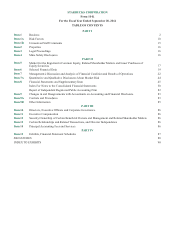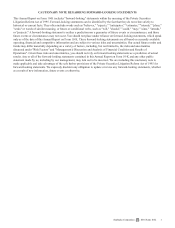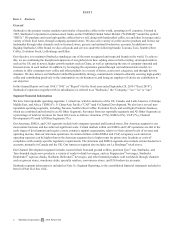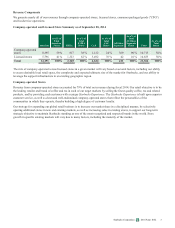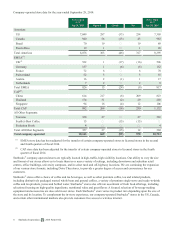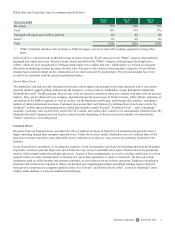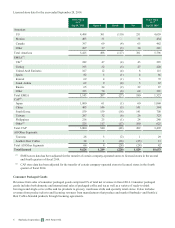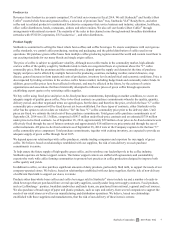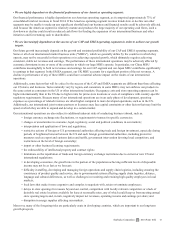Starbucks 2014 Annual Report Download - page 14
Download and view the complete annual report
Please find page 14 of the 2014 Starbucks annual report below. You can navigate through the pages in the report by either clicking on the pages listed below, or by using the keyword search tool below to find specific information within the annual report.
10 Starbucks Corporation 2014 Form 10-K
Available Information
Starbucks 10-K reports, along with all other reports and amendments filed with or furnished to the Securities and Exchange
Commission ("SEC"), are publicly available free of charge on the Investor Relations section of our website at
investor.starbucks.com or at www.sec.gov as soon as reasonably practicable after these materials are filed with or furnished to
the SEC. Our corporate governance policies, code of ethics and Board committee charters and policies are also posted on the
Investor Relations section of Starbucks website at investor.starbucks.com. The information on our website is not part of this or
any other report Starbucks files with, or furnishes to, the SEC.
Item 1A. Risk Factors
You should carefully consider the risks described below. If any of the risks and uncertainties described in the cautionary factors
described below actually occurs, our business, financial condition and results of operations, and the trading price of our
common stock could be materially and adversely affected. Moreover, we operate in a very competitive and rapidly changing
environment. New factors emerge from time to time and it is not possible to predict the impact of all these factors on our
business, financial condition or results of operation.
• Economic conditions in the US and certain international markets could adversely affect our business and financial results.
As a retailer that is dependent upon consumer discretionary spending, our results of operations are sensitive to changes in
macro-economic conditions. Our customers may have less money for discretionary purchases and may stop or reduce their
purchases of our products or trade down to Starbucks or competitors' lower priced products as a result of job losses,
foreclosures, bankruptcies, increased fuel and energy costs, higher interest rates, higher taxes and reduced access to credit.
Decreases in customer traffic and/or average value per transaction will negatively impact our financial performance as reduced
revenues without a corresponding decrease in expenses result in sales de-leveraging, which creates downward pressure on
margins and also negatively impacts comparable store sales, net revenues, operating income and earnings per share. There is
also a risk that if negative economic conditions persist for a long period of time or worsen, consumers may make long-lasting
changes to their discretionary purchasing behavior, including less frequent discretionary purchases on a more permanent basis.
• Our success depends substantially on the value of our brands and failure to preserve their value, either through our
actions or those of our business partners, could have a negative impact on our financial results.
We believe we have built an excellent reputation globally for the quality of our products, for delivery of a consistently positive
consumer experience and for our corporate social responsibility programs. Our brand is recognized throughout the world and
we have received high ratings in global brand value studies. To be successful in the future, particularly outside of the US, where
the Starbucks brand and our other brands are less well-known, we believe we must preserve, grow and leverage the value of our
brands across all sales channels. Brand value is based in part on consumer perceptions on a variety of subjective qualities.
Additionally, our business strategy, including our plans for new stores, foodservice, branded products and other initiatives,
relies significantly on a variety of business partners, including licensee and joint venture relationships, particularly in our
international markets. Licensees and food service operators are often authorized to use our logos and provide branded
beverages, food and other products directly to customers. We provide training and support to, and monitor the operations of,
certain of these business partners, but the product quality and service they deliver may be diminished by any number of factors
beyond our control, including financial pressures they may face. We believe customers expect the same quality of products and
service from our licensees and food services providers as they do from us and we strive to ensure customers receive the same
quality of products and service experience whether they visit a company-operated store, licensed store or food service location.
We also source our food, beverage and other products from a wide variety of domestic and international business partners in
our supply chain operations, and in certain cases such products are produced or sourced by our licensees directly.
Business incidents, whether isolated or recurring and whether originating from us or our business partners, that erode consumer
trust, such as actual or perceived breaches of privacy, contaminated food, recalls or other potential incidents discussed in this
risk factors section, particularly if the incidents receive considerable publicity, including rapidly through social or digital media,
or result in litigation, can significantly reduce brand value and have a negative impact on our financial results. Consumer
demand for our products and our brand equity could diminish significantly if we or our licensees or other business partners fail
to preserve the quality of our products, are perceived to act in an unethical or socially irresponsible manner, including with
respect to the sourcing or content of our products, fail to comply with laws and regulations or fail to deliver a consistently
positive consumer experience in each of our markets. Additionally, inconsistent uses of our brand and other of our intellectual
property assets, as well as failure to protect our intellectual property, including from unauthorized uses of our brand or other of
our intellectual property assets, can erode consumer trust and our brand value and have a negative impact on our financial
results.
•
Our information technology systems, such as those we use for our point-of-sale, web and mobile platforms, including online
and mobile payment systems and rewards programs, and for administrative functions, as well as the information technology
systems of our third party business partners and service providers, can contain personal, financial or other information that is
entrusted to us by our customers and employees. Our information technology systems also contain Starbucks proprietary and
other confidential information related to our business. Security breaches of our or a third party’s information technology
systems that result in the unauthorized access, theft or destruction of customers' or employees' data or that of the Company
stored in such systems, including through cyber-attacks or other external or internal methods, could result in a material loss of
revenues from the potential adverse impact to our reputation and brand, our ability to retain or attract new customers and the
potential disruption to our business and plans. Such security breaches also could result in a violation of applicable US and
international privacy and other laws, and subject us to private consumer or securities litigation and governmental investigations
and proceedings, any of which could result in our exposure to material civil or criminal liability. Our reputation and brand and
our ability to attract new customers could also be adversely impacted if we fail, or are perceived to have failed, to properly
respond to these incidents, which could also result in similar exposure to liability. Significant capital investments and other
expenditures could be required to remedy the problem and prevent future breaches, including costs associated with additional
security technologies, personnel, experts and credit monitoring services for those whose data has been breached. These costs,
which could be material, could adversely impact our results of operations in the period in which they are incurred and may not
meaningfully limit the success of future attempts to breach our information technology systems. Media or other reports of
existing or perceived security vulnerabilities in our systems or those of our third party business partners or service providers,
even if no breach has been attempted or has occurred, can also adversely impact our brand and reputation and materially impact
our business. Like many other retail companies and because of the prominence of our brand, we have experienced frequent
attempts to compromise our information technology systems but none have resulted in a material breach. Additionally, the
techniques and sophistication used to conduct cyber-attacks and breaches of information technology systems, as well as the
sources and targets of these attacks, change frequently and are often not recognized until such attacks are launched or have
been in place for a period of time. e continue to make significant investments in technology, third party services and
personnel to develop and implement systems and processes that are designed to anticipate cyber-attacks and prevent breaches
of our information technology systems or data loss, but these security measures cannot provide assurance that we will be
successful in preventing such breaches or data loss.
•
Instances or reports, whether true or not, of unclean water supply or food-safety issues, such as food-borne illnesses, food
tampering, food contamination or mislabeling, either during growing, manufacturing, packaging, storing or preparation, have in
the past severely injured the reputations of companies in the food processing, grocery and quick-service restaurant sectors and
could affect us as well. Any report linking us to the use of unclean water, food-borne illnesses or food tampering,
contamination, mislabeling or other food-safety issues could damage our brand value and severely hurt sales of our beverages
and food products, and possibly lead to product liability claims, litigation (including class actions) or damages. Clean water is
critical to the preparation of coffee and tea beverages and our ability to ensure a clean water supply to our stores can be limited,
particularly in some international locations. e have also incorporated many products in our food and beverage lineup that
require freezing or refrigeration, including produce (such as fruits and vegetables in our salads and juices), dairy products (such
as milk and cheeses) and meats. If customers become ill from food-borne illnesses, tampering, contamination, mislabeling or
other food-safety issues, we could also be forced to temporarily close some stores and/or supply chain facilities, as well as
recall products. In addition, instances of food-safety issues, even those involving solely the restaurants or stores of competitors
or of suppliers or distributors (regardless of whether we use or have used those suppliers or distributors), could, by resulting in
negative publicity about us or the foodservice industry in general, adversely affect our sales on a regional or global basis.
decrease in customer traffic as a result of food-safety concerns or negative publicity, or as a result of a temporary closure of any
of our stores or recalls, as well as adverse results of claims or litigation, could materially harm our business and results of
operations.
Some of our products contain caffeine, dairy products, sugar and other compounds, the health effects of which are the subject
of public scrutiny, including the suggestion that excessive consumption of caffeine, dairy products, sugar and other compounds
can lead to a variety of adverse health effects. Particularly in the US, there is increasing consumer awareness of health risks,
including obesity, due in part to increased publicity and attention from health organizations, as well as increased consumer
litigation based on alleged adverse health impacts of consumption of various food products. While we have a variety of
beverage and food items, including items that are coffee-free and have reduced calories, an unfavorable report on the health


